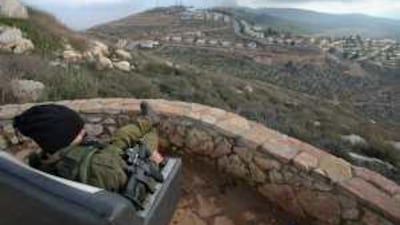RAMALLAH // Palestinian officials yesterday accused the Israeli army of being complicit in recent settler violence against Palestinian property and warned that unless Jewish settlers in the occupied West Bank are brought under control, there could be a repeat of the 1994 Hebron massacre.
Palestinians have been on alert in recent weeks as settlers have stepped up their campaign against a temporary and partial settlement construction freeze ordered by the Israeli government last month. Settlers have vandalised Palestinian property as part of what the Israeli media is calling the "price tag" campaign, so called because it aims to make any moves against settlements as practically difficult and politically costly as possible.
On Friday, a mosque in the West Bank village of Yasouf was the subject of an arson attack that has been pinned on settlers from the nearby Tapuah settlement. Part of the mosque and its library, including Qurans and religious books, were incinerated, while graffiti in Hebrew, one reading "we will retaliate with fire" and signed "Effi", was daubed on the floor. "Settler violence is increasing in Yasouf," said Abdelrahman Musleh, the village mayor, yesterday. "There is constant harassment and last month fires were set to four cars here."
"We fear that there will be another Goldstein," he added, in reference to Baruch Goldstein, an Israeli army doctor and Hebron-area settler who in 1994 killed 29 worshippers at prayer in the Ibrahimi Mosque in the city. Yasouf lies in an area of the West Bank that is under full Israeli security control. Mr Musleh said soldiers entered the village in the middle of the night and demanded people's identity documents, forcing them into their houses only hours before the settlers arrived. "It's not the first time," Mr Musleh said. "The army clears things out for the settlers and acts as cover. The settlers are too cowardly to enter alone."
For its part, the Israeli army said it was treating the incident with the "utmost seriousness" and an initial investigation is believed to focus on settlers from the nearby Tapuah settlement. Last night, Shimon Peres, the Israeli president, denounced the incident and urged that "all means possible" be deployed by the Israeli authorities to find those guilty. Palestinians reacted sceptically, however.
"Settlers feel that they are protected by the Israeli government," said Major Gen Adnan Damiri, the spokesman for the Palestinian security services. He pointed to a recent incident in which a Hebron area settler shot and then repeatedly drove his car over a Palestinian who had entered a settlement petrol station with a knife. The man died of his injuries, while the settler was sentenced to house arrest.
According to Yesh Din, an Israeli human rights organisation, in 69 incidents of settler vandalism against Palestinian property that the organisation has monitored since 2005, not a single investigation has led to indictment. Last week, Yesh Din's Dror Etkes said in an interview that he expected many more incidents of settler violence against Palestinians in the coming weeks, "because settlers enjoy very widespread impunity from the Israeli authorities, who will do close to nothing to find the perpetrators of such violence". Mr Damiri, meanwhile, said he thought the burning of the mosque in Yasouf was meant to provoke a violent Palestinian reaction as part of an Israeli policy that uses "settlers as tools to escalate the situation in the West Bank".
The Israeli army had to disperse a protest on Friday, when villagers from Yasouf marched on the Tapuah settlement in anger at the arson attack. Six demonstrators subsequently needed treatment for tear gas inhalation. Mr Damiri also invoked Baruch Goldstein. "I am confident that the one who smashed the Palestinian in Hebron is a mini-Goldstein and recent violent [settler] aggression against Palestinians in Assira al Qiblyia and Burin indicates that settlers are aiming to commit another massacre. The army is only facilitating this."
Mr Damiri said Palestinian security forces had registered several protests with the Israeli army over settler violence, supplying the military with photographs and other evidence, but that no action had been taken by the Israeli authorities. Settlers are protesting a 10-month moratorium on settlement construction that excludes occupied East Jerusalem, 3,000 housing units already begun as well as building deemed "essential" for normal life in settlements, from synagogues to preschool nurseries.
These are concessions specifically aimed at placating settlers and which as a result have angered Palestinians who have said they will not return to negotiations unless a comprehensive freeze is implemented. okarmi@thenational.ae

